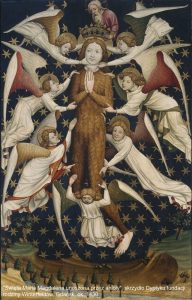
Living in the “Fifth Gospel”, the Holy Land, tantalizes the imagination. Recently it brought about a line of thought I never imagined my mind would take. I asked the question: When we think of the exalted vocation of motherhood, we immediately think of Mary, the Mother of Jesus as model. But could we look to Mary of Magdala as a woman with an expansive maternal heart? What ultimately constitutes “motherhood”, beyond the evident physical bearing of children? John Paul II summed it up for me:
The moral and spiritual strength of a woman is joined to her awareness that God entrusts the human being to her in a special way… Our time in particular awaits the manifestation of that “genius” which belongs to every woman, and which can ensure sensitivity for human beings in every circumstance (Mulieris Dignitatem 30).
Mary, the Mother of God is a model of sensitivity for all persons in all circumstances. Her sensitivity to the human details at the wedding of Cana becomes a catalyst for launching Jesus’ public ministry where we see the fecundity of a Mother’s request: a transformation of water to wine. Her bleeding and suffering heart accompanies her Son to the foot of the cross, bearing fruit in her vocation as universal Mother of the Church. The body of Jesus taken down from the cross and received by his Mother summons up the image of the Mystical Body of Christ embraced by the New Eve.
Do I dare speak of the motherhood or maternal heart of Mary Magdalene in the same page as the Mother of God? Without usurping Our Blessed Mother’s role in the history of salvation, I can’t help but ponder the testimony of Mary Magdalene in this vein. I look upon the mosaic image in Magdala’s Duc In Altum worship center. Jesus expels 7 demons from Mary Magdalene. The artist, Maria Jesús de Fernandez, crafted 6 small demons and 1 large serpent fleeing away from her person. The serpent brings us to the Garden of Eden from which the first Eve fled after having eaten the “forbidden fruit”. Now the serpent flees from a “New Eve” who is permitted into the Kingdom of God. Jesus’ pointing finger recalls his own words in Luke 11:20, “If I drive out demons by the finger of God, then the kingdom of God has come upon you.”
Mary Magdalene is restored to a new woman in Christ. The formation of her heart begins through a powerful encounter with unconditional love. Her initial receptivity to the gift of grace expands her heart. The desire to offer gratitude and love in return pours forth as the balsam that anoints Jesus, prophesying the birth pains to be born for all God’s children in Jesus’ passion and death. Mary then becomes one of the few to suffer in solidarity with her beloved and is privileged to be the first recorded witness of the resurrection, a sure sign of New Life for all.
John’s account of Mary Magdalene seeking her beloved in the garden evoked reflections in early Christianity of this Mary as a New Eve. She is the expectant bride longing for the presence of her beloved, echoed in the Song of Songs. Yet that longing is rewarded with the words, “Do not touch me!” The beginning of a deep spiritual spousal relationship with Jesus must be lived in faith. From faith her spiritual maternal vocation will bear fruit. She had accompanied and provided for Jesus and his apostles (Lk 8:2-3). She had born suffering at the foot of the cross and reverently sought out Jesus on the third day. She is a woman forged through her response to life’s circumstances. She possesses an expansive, sensitive heart. But how does that play out?
Tradition bears witness to Mary Magdalene’s contemplative vocation as a penitent hermit in southern France. We can imagine her spirit of oblation taking the form of repentance for the salvation of souls. It is a vocation mocked and little understood in today’s culture. Yet, embraced, becomes a hidden, sacrificial and life-giving motherhood in the eyes of God. As a saint, she becomes a model of “genius,” that belongs to every woman desiring to form a sensitive, expansive and maternal heart.
She particularly becomes a model for the consecrated woman. The forms of consecrated life abound today in the Catholic church, from lay consecrations to religious sisters and contemplative nuns. Before all the labels and categories, there was the “Mary Magdalene”, a woman whose chaste heart manifested an oblative love for Jesus; a woman who gave flesh to St Paul’s motto: “The love of Christ impels me.” These “Mary Magdalenes,” often hidden, exist today in all corners of the world, offering their genius to a world longing for a maternal touch.
Mary, Mother of God and Mary Magdalene, pray for us, that we may grow in an ever deeper intimacy with our beloved Jesus that bears fruit in an expansive maternal heart.
